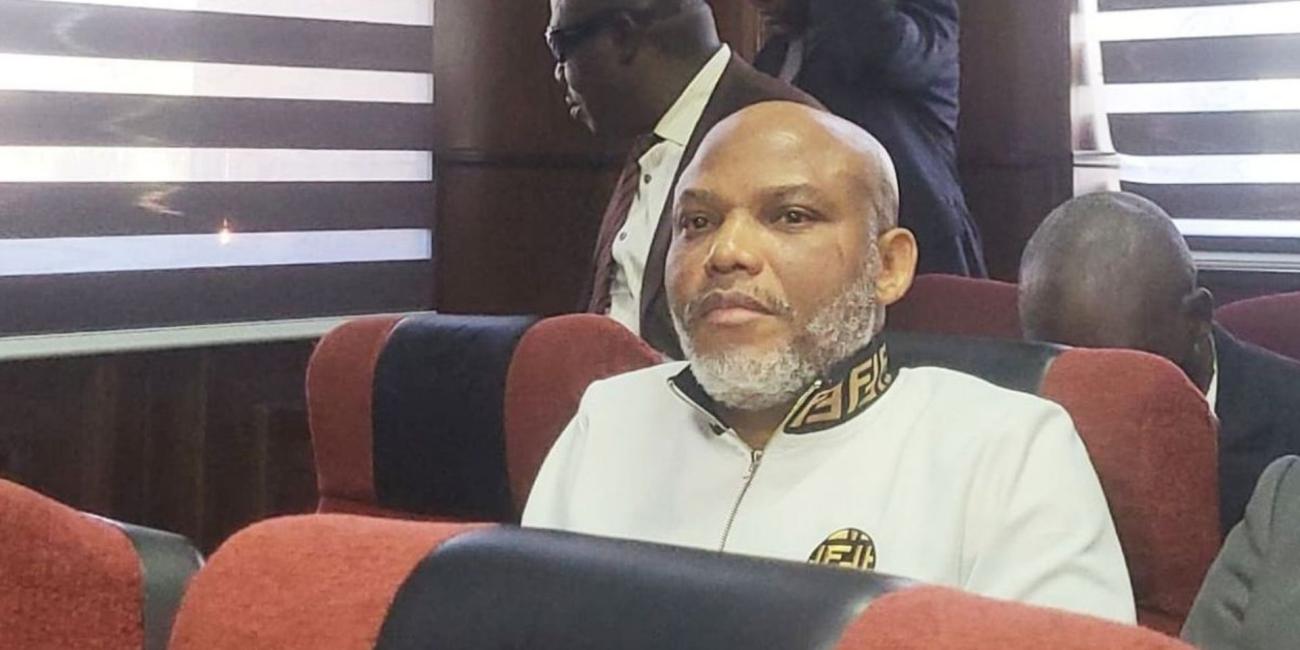
Bellnews had reported that Justice Omotosho had convicted Nnamdi Kanu, leader of the Indigenous People of Biafra (IPOB) on seven counts charge bordering on terrorism, being leader of a terrorist organisation.
The Mazi Nnamdi Kanu Global Defence Consortium has denounced the November 20, 2025 judgement delivered by Justice James Omotosho of the Federal High Court, Abuja, describing the ruling as “void, unconstitutional and unsustainable in law.”
Bellnews had reported that Justice Omotosho had convicted Nnamdi Kanu, leader of the Indigenous People of Biafra (IPOB) on seven counts charge bordering on terrorism, being leader of a terrorist organisation.
Although an Enugu High Court had in October 2023 nullified and voided the proscription of IPOB as a terrorist organisation, a judgement that has not been overturned, Justice Omotosho convicted Nnamdi Kanu as a leader of proscribed organisation.
However, in a public briefing issued on Saturday and signed by Njoku Jude Njoku, Esq., the consortium argued that the conviction of the detained IPOB leader under provisions of the Terrorism (Prevention) (Amendment) Act 2013 was fundamentally defective because the statute had been repealed.
“The 20 November 2025 judgment delivered by Hon. Justice James Omotosho in FRN v. Nnamdi Kanu is unsustainable in law, untenable under the Constitution, and void for want of jurisdiction,” the statement read.
“This is not rhetoric. It is a matter of black-letter law, constitutional command, and non-negotiable legal principle.”
Central to the defence’s objection is the claim that Section 104 of the Terrorism (Prevention and Prohibition) Act (TPPA) 2022 expressly repealed the 2013 terrorism law on which Justice Omotosho based the conviction.
“A repealed law is a dead law. A court cannot revive it. A conviction cannot stand on it,” Njoku stated emphatically.
He cited Section 36(12) of the 1999 Constitution, which requires that any offence must be defined and its penalty prescribed in a “written law” currently in force.
“On 20 November 2025, the 2013 Act was not in force. It is legally impossible to convict anyone under it. This alone renders the judgement a nullity,” he insisted.
The consortium also dismissed the Nigerian government’s attempt to rely on a savings clause in the 2022 Act to justify the application of the repealed 2013 law.
“Savings clauses preserve pending matters. They do not create new proceedings. They do not override the Constitution. They do not resurrect repealed laws,” the statement explained.
The defence maintained that since Kanu had been discharged by the Court of Appeal on 13 October 2022, there was no pending case to be “saved,” and what followed in 2023 amounted to a new trial.
“The attempt to use a transitional clause as a resurrection tool is legally impermissible,” Njoku said
According to the consortium, the extant TPPA 2022 “materially changes Nigerian terrorism law” by requiring violent or grievous conduct, and expressly excluding non-violent political activity.
“Terrorism now requires conduct involving violence or grievous harm. Non-violent protest, advocacy, dissent and political agitation are expressly excluded,” the statement noted.
They argued that the allegations against Kanu — “speeches, broadcasts and political advocacy” — fall outside the scope of terrorism under the current statute.
“The Constitution (Section 36(8)) requires courts to apply the lighter or more favourable law. The trial court failed to do so,” Njoku added.
The consortium described the ruling as one that “violates Section 1(3) on the supremacy of the Constitution, breaches Sections 36(8), 36(9) and 36(12), lacks jurisdiction, and is incapable of withstanding appellate review.”
“These are not technicalities,” the lawyers stressed. “They go to the foundation of the criminal justice system.”
The defence team confirmed that an appeal would be filed immediately.
“This judgment will not survive appellate scrutiny,” the statement declared.
“The grounds are rooted firmly in constitutional supremacy, statutory repeal, the doctrine of nullity, and the mandatory application of the extant 2022 Act.”
The consortium expressed confidence that the Court of Appeal would overturn Justice Omotosho’s decision.
“We remain confident that the Court of Appeal will restore legality, uphold constitutional norms, and vacate this defective conviction,” Njoku concluded.

